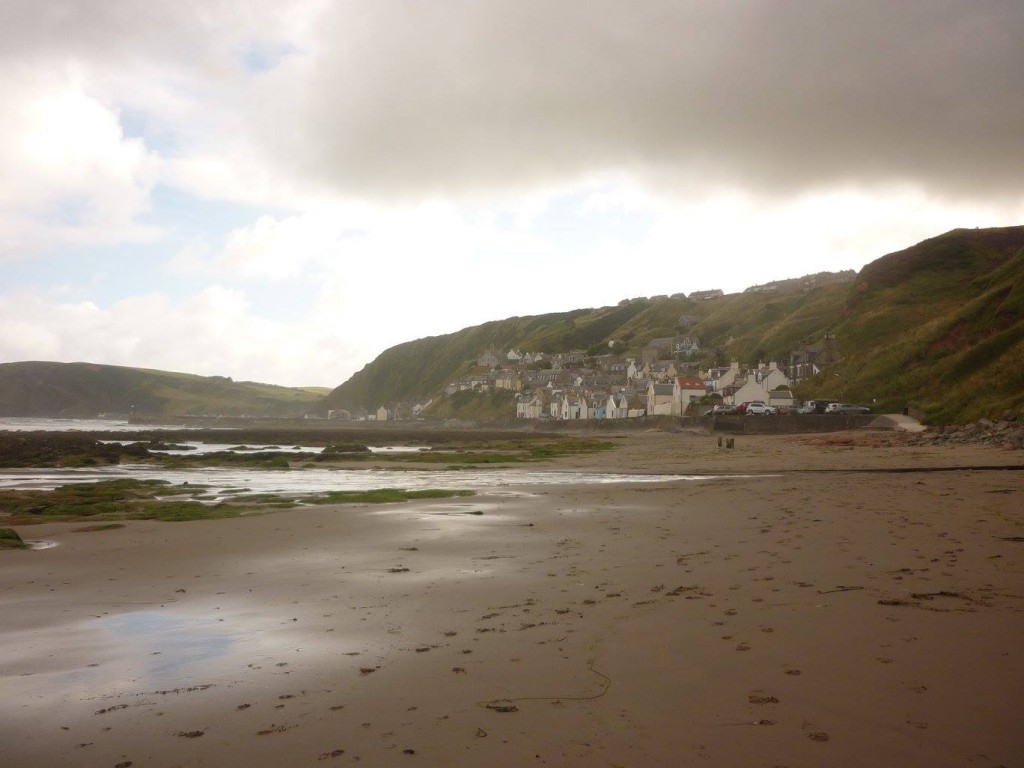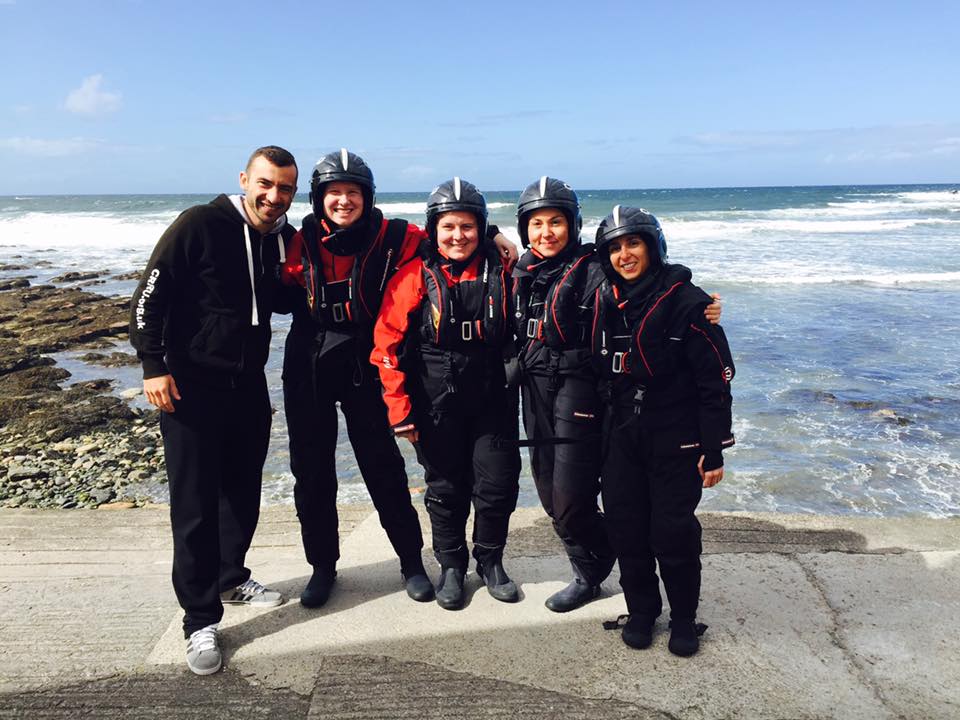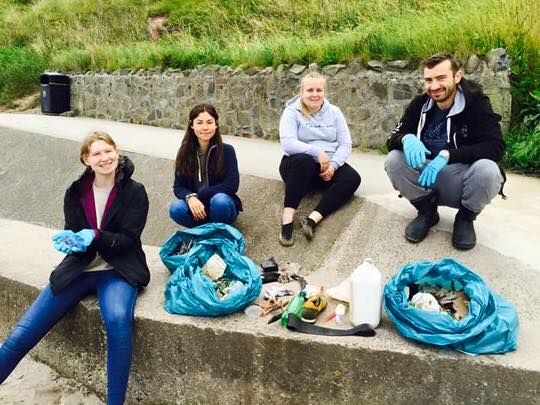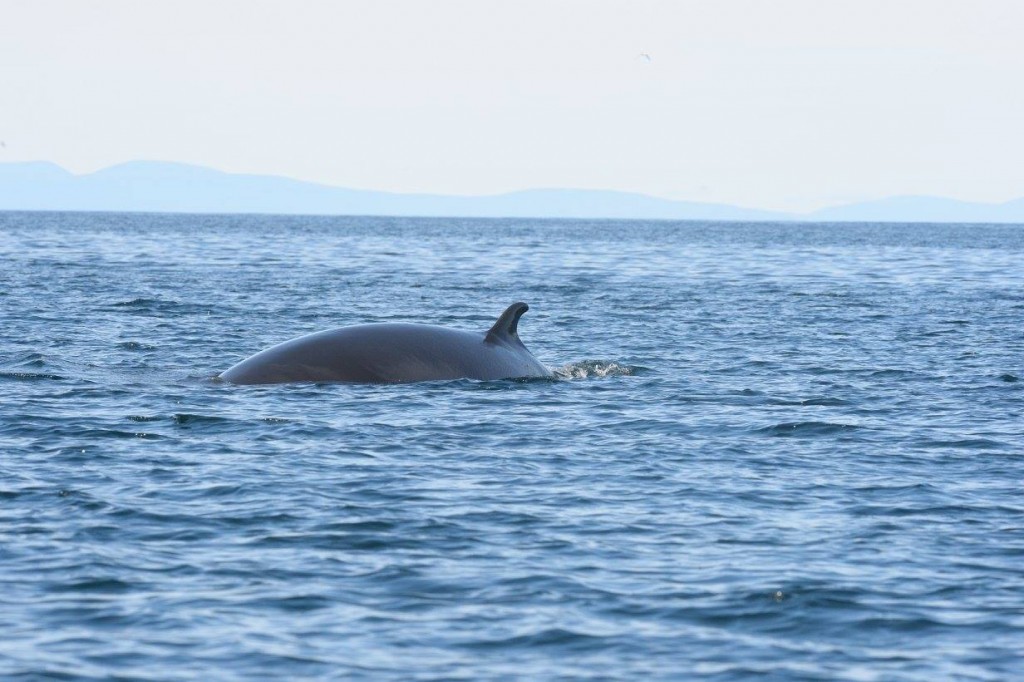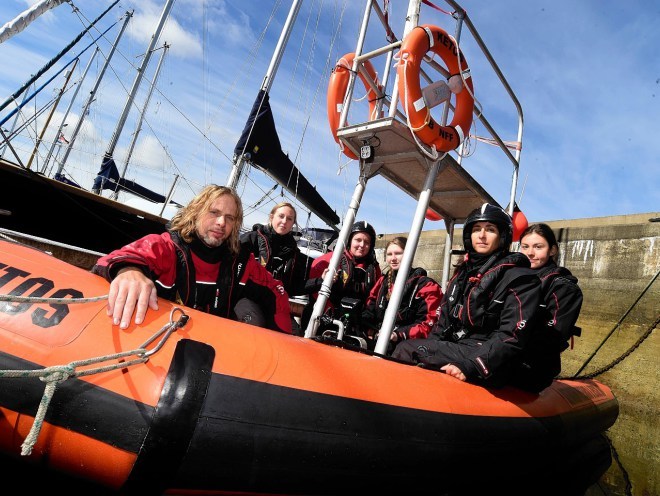Marine Life & Conservation Blogs
Cetaceans and conservation: My summer with the CRRU
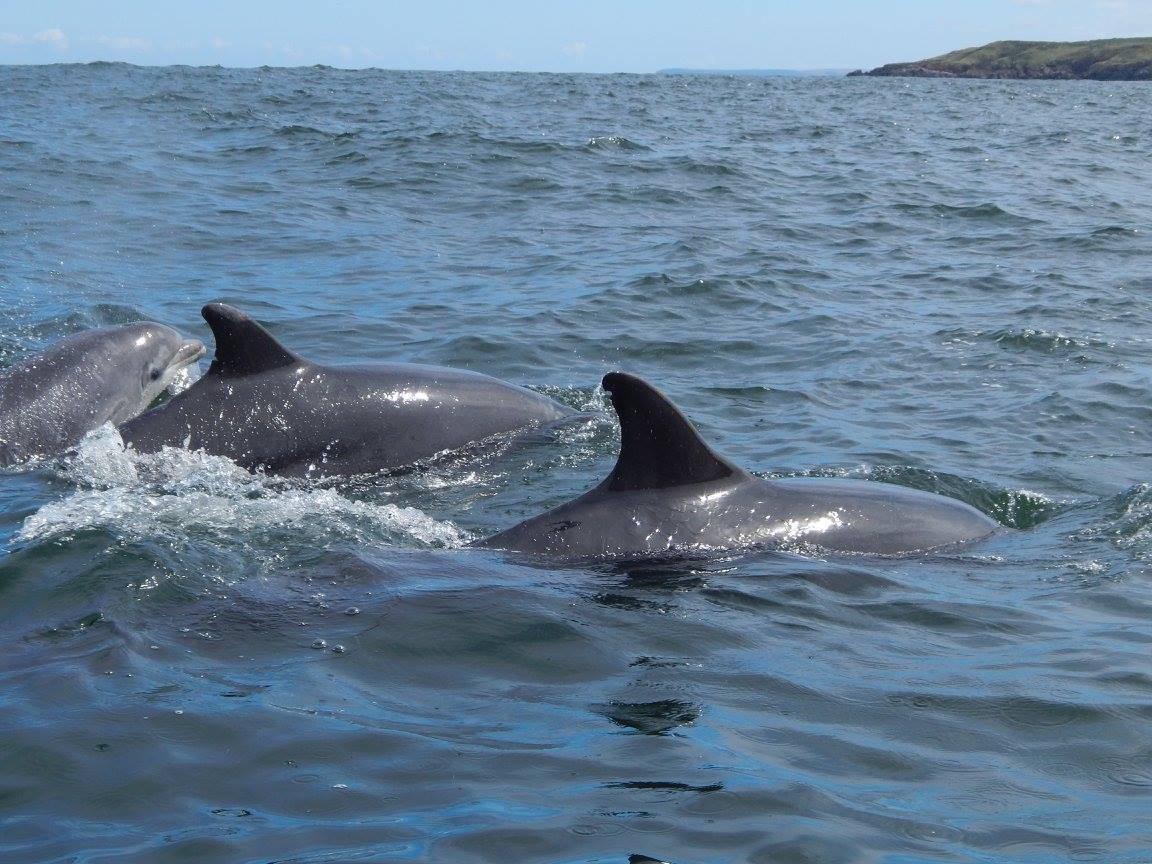
Summer breaks are the opportunity for people to explore new areas and to relax in the sunshine. Mine however took a different angle, spending it in a small village in the north of Scotland. The north east Scottish coastline has a high biodiversity of marine mammals, and provides the perfect setting for innovative work in marine conservation.
The Banff-based CRRU (Cetacean Research & Rescue Unit) was set up in 1997, growing in size thanks to its unstoppable group of dedicated volunteers. Come rain or shine, they are working to improve our knowledge of cetaceans (whales, dolphins and porpoises) in our UK waters, from the ever-popular bottlenose dolphin to the lesser known minke whale.
So where do I start? My summer with the CRRU was a completely eye opening experience. It was my first volunteer experience in this field as a research intern, and I saw more species than I could possibly list; rare birds and marine mammals which people only dream of seeing. But I also felt like I made a difference. Even in my short time there. Not a single day there was ever the same, allowing me to develop different skills and learn different tactics for conservation.
The first few days I was there, a lot of our time was used to learn. Learning about the charity, how to collect data, about the species we would be working with and why what is being done is so important. This allowed the research teams to bond and learn how to work together quickly and effectively so when we finally found the animals we could complete the necessary data forms quickly, thereby causing minimum disruption to the study animals.
The rest of my time was spent between conservation, fund-raising, research and of course having fun! We would spend our days doing a variety of different activities, from beach cleans to watching gannet colonies from the cliff tops.
The charity has an unfathomable amount of publications on the work that they do, and their papers, research and data are used globally for the protection of the species studied. The charity’s science team works tirelessly throughout the summer in Scotland to collect data to improve current knowledge of the whales and dolphins of the Moray Firth. So far, their work has been invaluable to the protection of minke whales in north-east coastal waters resulting in recommendation for the first ever MPA (Marine Protected Area) for these coastal cetaceans in the UK.
Due to being a relatively small charity, the CRRU has limited funding, however. Currently all of their work is being carried-out from one of two small, rigid inflatable boats, but ongoing fundraising is being conducted for a new, much larger vessel which would allow the charity to continue its long-term monitoring studies. The current boats, first used in 2000, are becoming too old and are struggling to keep up with the increasing workload. The research team has a wide variety of work they are attempting to do from the boats when they meet their study species. Currently they are attempting to get biopsies from minke whales to allow them to learn more about what the whales are eating and evaluate the levels of pollutants in their bodies and the surrounding marine environment. They also do behavioural studies and attempt to do temporary tagging of whales so they can study their movements and diving behaviour, which is all very relevant to abundance estimates currently used to designate unfavourable whaling quotas to neighbouring whaling countries such as Norway and Iceland, that sadly still harvest these whales. The new boat will also be central to the CRRU’s emergency response teams for live-stranded whales and dolphins across Scotland. The larger boat will allow the rescue teams to carry more equipment and operate in often inclement and unfavourable sea conditions.
While I was with the CRRU, I was able to gain a qualification in Marine Mammal Rescue, which means I can now act as a volunteer Marine Mammal Medic, assisting in ongoing UK rescue efforts for sick or stranded whales and dolphins which inevitably get into trouble around the UK coastline each year. The course, which is made up of both practical and theory based sessions is run by the charity as a free service to interested volunteers. So far they have trained over 1,600 people in Scotland. They don’t do this work for the research but to look after the welfare of the animals. The CRRU have a 24/7 line for people to call if they find a stranded marine animal, and they operate the only dedicated specialist response team for whales, dolphins and porpoises in Scotland. For more information about the charity’s rescue efforts, Check out their website here.
Don’t just take my word for it – to me and many people who have joined the CRRU as a volunteer intern, this is an amazing opportunity with fantastic people who know so much in this field. So why don’t you try it out too? Summer placements are now being accepted for 2017 – click here to find out more.
If you would like to donate towards the new boat, you can also help by clicking on their fundraising page here.
Blogs
Saba’s Plan for a Coral Comeback

Saba has an exciting new initiative to restore its coral reefs. This new project, running from 2024 to 2026, will focus on reviving key species in the island’s underwater ecosystems. With a collaborative team from the Saba Conservation Foundation (SCF) and Van Hall Larenstein (VHL) University of Applied Sciences, the project aims to restore both corals as well as sea urchins.
This initiative is centered around coral restoration, specifically reviving two essential coral species—staghorn coral (Acropora cervicornis) and elkhorn coral (Acropora palmata). By mapping parent colonies and using a technique known as coral gardening, SCF will create and maintain coral nurseries. These corals will eventually be outplanted at key reef sites around Saba to not only expand the number of coral colonies, but also provide essential fish habitat. The project focusses on installing coral nurseries, training staff with the newest techniques and starting with the restoration of key reef sites.

Reef Cleaners to the Rescue
It’s not just corals getting a makeover—this project also shines a spotlight on the essential role of grazers, particularly sea urchins. VHL is leading the charge on cultivating and restocking two key sea urchin species, West Indian sea egg (Tripneustes) and long-spined sea urchin (Diadema), known for their ability to keep algae in check. By removing algae, which are important competitors of corals, they help the coral to thrive. By restoring these “reef cleaners,” Saba’s project will give corals the breathing room they need to grow, setting the stage for a healthier, more balanced marine ecosystem.
From Tiny Urchins to Big Goals
The project will be funded as part of the Dutch Government’s Nature and Environment Policy Plan (NEPP) 2020-2030 for the Caribbean Netherlands, a comprehensive initiative aimed at conserving and restoring the unique natural environments of the Dutch Caribbean islands, including Saba, St. Eustatius, and Bonaire. This project is aiming for big milestones: build and maintaining coral nurseries, the expansion of urchin cultivation facilities, and the creation of a dedicated research center. By 2026, the project hopes to ramp up coral and grazer restoration, with the ultimate goal of extending these efforts across the Dutch Caribbean. By linking local initiatives to broader regional goals, Saba’s restoration project promises to leave a lasting impact on both the environment and the community.
Find out more about the DCNA at dcnanature.org.
Blogs
Reef-World marks two decades of marine conservation: strengthening impact amid coral reef threats

Empowering ocean stakeholders to tackle future challenges and ensure the survival of coral reefs and humanity
2024 marks the 20th Anniversary of The Reef-World Foundation’s tireless efforts for global coral reef conservation. The UK charity is the international coordinator of the UN Environment Programme’s Green Fins initiative, known as the leading voice in sustainable marine tourism. Today, Reef-World released its 2023-2024 Impact Report outlining a year of substantive growth and impact in its marine conservation programmes.

Impact Report Highlights:
- Impressive improvements in environmental behaviours to protect coral reefs by the marine tourism industry as the global participation of Green Fins increases.
- Continued capacity building for government and NGO staff to effectively manage marine tourism activities in Asia, Caribbean and Red Sea regions.
- For the first time in Green Fins’ 20-year history, tourism operators have achieved ‘Best Environmental Performer’ status by demonstrating the lowest possible environmental impact in their environmental assessments. In 2024, three dive operators achieved this challenging milestone.
- Significant increases in global participation of Reef-World’s innovative digital conservation tools.
- 138 Green Fins dive operator members achieved the strict threshold for PADI Eco Center recognition.
- Developed four new educational materials and translated two into 16 languages to support the marine tourism industry in achieving sustainability targets.
- Establishing a new Reef-World Development strategy and recruiting new roles – Development and Programmes Managers.
- Reef-World’s board welcomes new Chair and Trustees strengthening organisational leadership.

Reef-World started as a one-person mission to inspire and empower communities to act in conserving and sustainably developing coral reefs and related ecosystems. Today, the team of 12 continues to meet this mission by inspiring and empowering the global marine tourism community to be exemplary sustainability leaders by using the Green Fins guidelines and tools to simultaneously use and protect the world’s precious reefs.
In April 2024, the fourth global coral reef bleaching event was confirmed. Reef-World’s work has never been more urgent as the marine environment, and the benefits they provide humanity, continue to be eroded by global threats. The reduction of local threats, like those from the marine tourism industry, is an essential step to ensuring a future where coral reefs survive and continue to support the millions of people who depend on their ecosystem benefits. Reef-World’s work buys time for coral reefs and related ecosystems to be resilient to the impacts of global threats.
“Right now our corals are facing the greatest fight of their existence as the terrifying predictions of the steps towards their complete extinction are starting to come true. But all is not lost, reefs are resilient and they have existed on this planet for millions of years. We must take action now, to buy time for reefs by reducing threats facing them and allowing them to react and adjust to the changing environment they need to survive in.” – Chloe Harvey, Executive Director
Looking Forwards:
Like coral reefs, the Reef-World team needs to be resilient in the face of the complex challenges of the conservation sector. Reef-World has invested significantly in developing a Culture of Care to ensure the well-being of its team on a daily basis, continuing to be an exemplary employer to enable its team to best achieve the mission for coral reef conservation.
With the foundations of a Culture of Care and organisational development laid, Reef-World is emerging from the end of a natural organisation life cycle, that brings the challenges of growth and scale, stronger than ever. With a new strategy in place to generate much needed resources, Reef-World is excited for the opportunities to leap forward, continue to scale our impact and lean into new innovations and untapped opportunities for marine conservation.
We continually strive to become a forward-thinking organisation that delivers on our goals and commitments to our stakeholders with fresh approaches and not being afraid of steering away from a “normal approach.” This approach is not only applied to our programmes of work but also internally and carries over to our Culture of Care for our team.” — JJ Harvey, Operations Director

The Reef-World Foundation is immensely grateful for the continued support of its grant funders: UN Environment Programme, IUCN’s Blue Natural Capital Financing Facility, Adventure Travel Conservation Fund, PADI Aware Foundation, and World Nomads Footprints Program.
Reef-World would also like to express its gratitude to international partners whose vital support has resulted in significant tangible benefits for our work and mission: PADI; Professional SCUBA Schools International (PSS); Explorer Ventures; 1% for the Planet; ZuBlu; Snorkel Venture, GSTC; Dive O’Clock; Seven Dragons; DiveAssure and Eco Beach, without whom these achievements would not be possible.
The full 2023–2024 Annual Impact Report is available on Reef-World’s website.
-

 News2 months ago
News2 months agoIconic SS United States to become the World’s Largest Artificial Reef
-

 News3 months ago
News3 months agoBook Review – 52 Assignments: Underwater Photography
-

 Gear News3 months ago
Gear News3 months agoDYNAMICNORD – New German diving brand enters the British market
-

 News3 months ago
News3 months agoExploring Cenote El Pit: A Diver’s Dream
-

 Gear News3 months ago
Gear News3 months agoTry BARE drysuits (and maybe even win one!) this Friday with Sea & Sea at North West Dive Fest
-

 Marine Life & Conservation3 months ago
Marine Life & Conservation3 months agoBook Review: Coral Triangle Cameos
-

 Blogs2 months ago
Blogs2 months agoDive the Egyptian Red Sea this Autumn with Regaldive
-

 News3 months ago
News3 months ago2024 Ocean Art Underwater Photo Competition Announced


